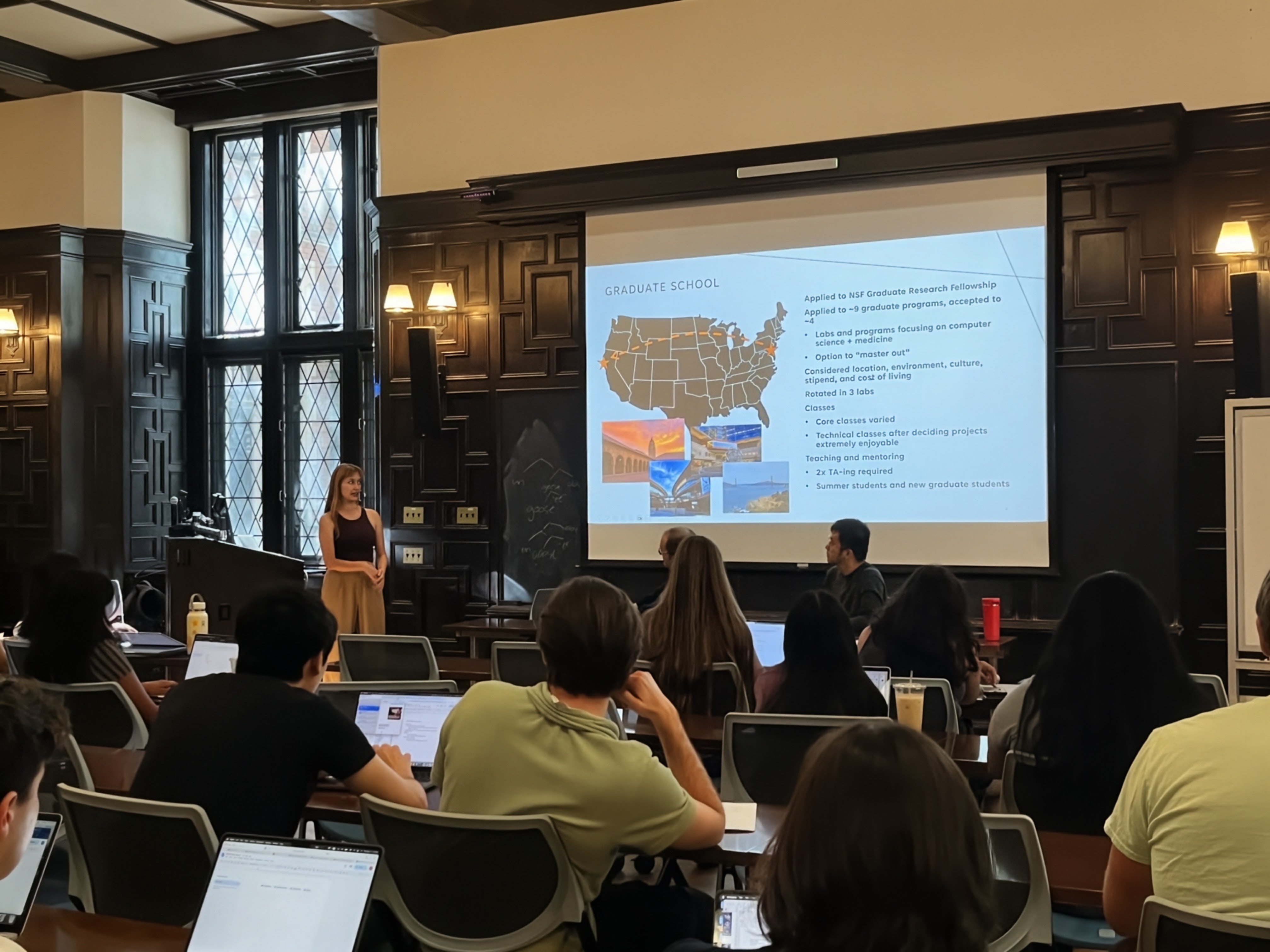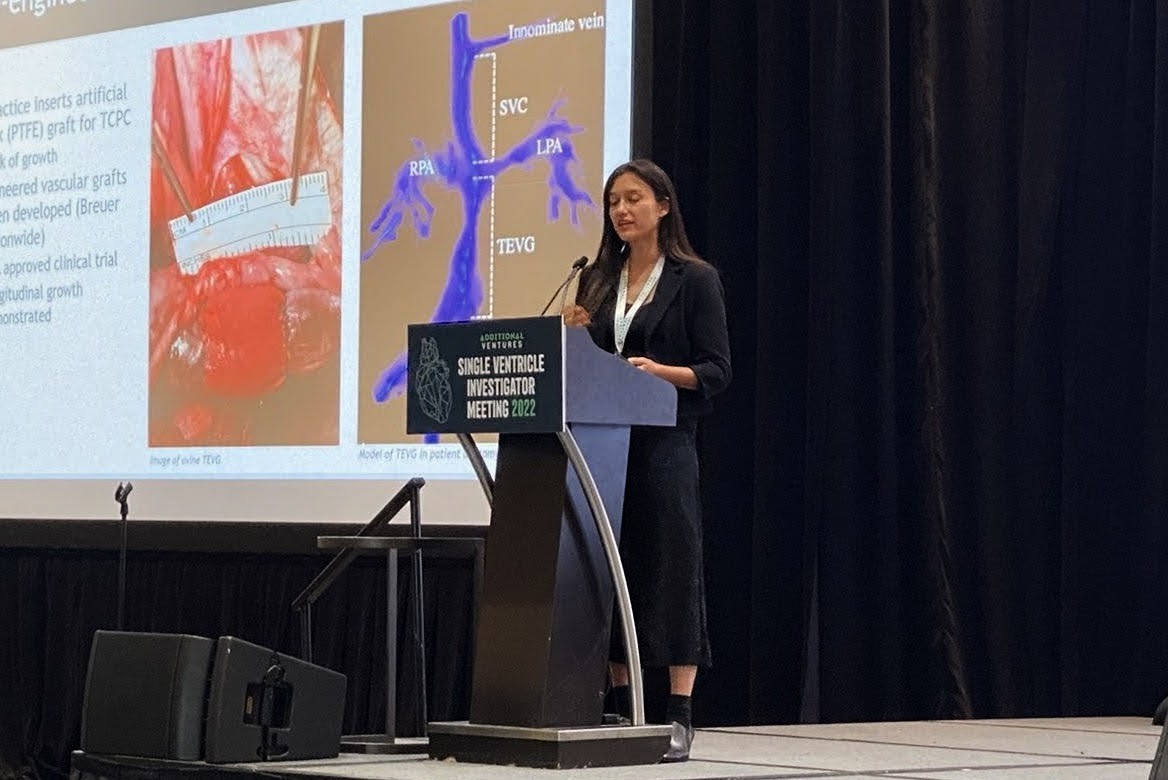Erica L. Schwarz, Ph.D.
Teaching Statement
Teaching Philosophy
Teaching excellence is critical to fostering a strong academic research environment. By connecting theory to practical problem solving, I aim to empower students to address pressing challenges across research and industry. I also believe that equitable and inclusive teaching practices strengthen scientific training by allowing diverse perspectives to drive discovery and by giving educators a framework to develop effective, modern pedagogy.
As an assistant professor, I will apply this philosophy in fundamental mechanical engineering courses and expand the curriculum to more deeply encompass the intersection between mechanical engineering and biological sciences. I will include topics in artificial intelligence at this intersection, ensuring that students in this program are prepared to address complex, multidisciplinary problems in the modern era.
Teaching Experience
Teaching has been a central part of my research career, providing opportunities to mentor students, build scientific community, and refine my technical communication skills.
As a graduate student at Stanford, I served as a teaching assistant for Bioengineering Senior Capstone Design. As a teaching assistant, I conducted lectures on project design, provided feedback on project documents, and offered technical assistance in constructing, testing, and validating mechanical prototypes. Under my guidance, these design teams were competitive for awards from national engineering challenges and translational research grants.
I have additionally led technical courses. I served as the teaching assistant for Computational Modeling in the Cardiovascular System, a graduate-level course that covered analytical and computational methods for simulating cardiovascular fluid dynamics. My responsibilities included leading discussion sections where I prepared miniature lectures and application-based examples to supplement the main course. I built an inclusive learning environment by encouraging students to ask questions and taking the time to discuss any knowledge gaps both as a group and individually.
I received exceptionally positive feedback on my teaching. Quotes from students’ anonymous feedback included:
“I really couldn’t have asked for a better TA. Erica was phenomenal.”
“Erica is one of the best TAs I have had at Stanford.”
“She was extremely patient when teaching […] very good at explaining difficult concepts, especially in terms of drawing things and explaining ideas visually.”
“Erica was clearly very knowledgeable, and I always felt like she was really prepared for office hours and lectures.”
Since becoming a postdoctoral researcher, I have continued to pursue teaching excellence through guest lectures at multiple institutions in both Mechanical Engineering and Biomedical Engineering departments:
- Yale University (2023, 2024) — Guest lecture in Discover and Design in Biomedical Research, outlining the process of completing a biomedical research project from conception to execution.
- University of California, San Diego (2024) — Graduate-level lecture on soft-tissue growth and remodeling for Cardiovascular Fluid Mechanics, including flow-mediated mechanotransduction modeling techniques.
- Yale University (2024) — Two-part lecture series on vector calculus in Mathematical Methods I.
- Yale University (2025) — Presentation of academic career pathways for senior students in the Biomedical Engineering Department’s required Senior Seminar, highlighting both traditional and non-traditional opportunities in academia.
- Fairfield University (2025) — Senior-level lecture on fluid dynamics in Cardiac Mechanics covering the derivation of the Navier–Stokes equations and their incompressible and inviscid forms.
Throughout these teaching opportunities, I have continued to actively hone my teaching skills. This included pursuing the Certificate of College Teaching Preparation offered by the Yale Poorvu Center for Teaching and Learning, which provides resources for creating inclusive classroom climates and building awareness of implicit biases in education.
As part of this process, I received formal observation and feedback from the Poorvu Center for Teaching and Learning on my Mathematical Methods I lectures. Their trained observer highlighted my ability to create a safe and welcoming learning environment and to modify my teaching approach in real-time to meet the needs of students. Their feedback stated:
“Erica gave students positive feedback when they asked questions, which created a comfortable environment. It was also clear that Erica used student questions as a kind of informal feedback for her own teaching.”

Mentoring Experience
Mentorship provides an opportunity to advance research by cultivating the next generation of innovators and scholars who will actively contribute to scientific discovery. As a graduate student and postdoctoral researcher, I have been the primary mentor for four undergraduates and three graduate students. I tailored my mentorship approach to each mentee, integrating their unique backgrounds, skills, and future goals to foster their development as independent researchers.
To support this, I led supplemental technical workshops on coding, mathematical modeling, and academic writing to ensure each mentee started their research experience with strong foundational skills. This allowed all mentees to excel in their work regardless of their starting skill level.
My ability to provide quality mentorship to diverse mentees is illustrated by my work with two undergraduate students. These undergraduates began working with me through individual summer programs, one of which focused on serving underrepresented minorities in STEM. After their initial summer projects, I continued to mentor them for three years on an independent research project, which they published in a peer-reviewed journal as first and second authors respectively.
One of these students, a first-generation college student, sought to attend medical school after his undergraduate education. To support this goal, I provided mentorship on scholarship resources, aided in the preparation of application materials, and wrote letters of recommendation that spoke to his skills and persistence as a biomedical researcher. He was accepted to several medical schools and matriculated last fall. Since then, he has continued participating in research at his institution.
As an assistant professor, I will continue to provide strong mentorship both within my research group and in the wider university environment. I plan to serve as a faculty mentor for organizations such as the Society of Women Engineers and to engage prospective students through summer programs and recruitment events.
Teaching Plans
I have a rigorous interdisciplinary background in mechanical engineering, computer science, and biomedical engineering. As such, I am uniquely positioned to teach classes at the intersection of mechanical engineering and biological sciences.
As an assistant professor, this will include core classes in the Mechanical and Biomedical Engineering Departments, such as:
- Solid Mechanics of Living Tissues
- Introduction to Finite Element Analysis
- Fluid Dynamics of Biological Systems
I will also develop new courses that strengthen each department, focusing on how fluid dynamics and mechanotransduction influence health and disease:
-
Cardiovascular Fluid Dynamics
This graduate-level course will focus on methods for modeling blood flow in deformable vessels. It will cover three-dimensional equations of flow, particularly the incompressible form of the Navier–Stokes equations applicable to cardiovascular systems. Lectures will then move through reduced-order formulations, integrating discussions of Poiseuille flow and lumped parameter networks. Technical lectures will be integrated with application-based discussions, providing an overview of cardiovascular diseases and identifying appropriate use cases for different formulations of governing fluid dynamics equations. Emphasis will be placed on application-based learning, with example problems drawn from recent research articles that demonstrate the practical applications of discussed principles. This pedagogical approach will empower students to translate core mechanical engineering concepts to real-world problems.
-
Mechanics of Growth and Remodeling
This graduate-level course will examine how mechanical forces influence the development and adaptation of living systems, encompassing biological tissues including bone, blood vessels, and skin. The course will cover leading theories of biological growth, including kinematic growth theory and constrained mixture theory, drawing on fundamental principles of fluid dynamics, solid mechanics, and linear elasticity. Extended methods such as cell-signaling models will also be introduced, connecting molecular mechanisms to tissue-level mechanical behavior. Through this integration, students will gain a deeper understanding of how mechanical and biological processes interact to guide growth and remodeling in health and disease.
-
In Silico Datasets for Clinical Machine Learning
This graduate-level course will introduce students to the development and use of in silico datasets for training and validating neural operators. Students will learn how to design computational experiments and generate high-fidelity simulation data that can be integrated with clinical datasets to create predictive models. The course will combine lectures on physics-based simulations and neural operator design with illustrative assignments focused on cardiovascular applications. By the end of the course, students will be able to build machine learning models that combine in silico and in vivo data for applications in engineering and medicine. Note: This course will not focus on physics-informed machine learning, which embeds governing physical equations into the neural network itself. Instead, it will emphasize how in silico data generated from physics-based simulations can amplify the power and interpretability of machine learning in the clinical setting.
These courses bridge mechanical engineering and bioengineering, equipping students with strong technical foundations that connect to topics in emerging fields.
Community and Service
As a graduate student, I served as Advocacy Chair for the Stanford Biomedical Association for the Interest of Minority Students, where I organized forums for students to raise issues affecting underrepresented communities and developed programming to address these concerns. My term focused on expanding spaces for queer students on campus, including the creation of inclusive facilities within lab spaces. I also supported initiatives to promote student mental health, such as hosting a campus psychological services open house and a student mental health forum. In addition, I worked to advocate for women in STEM by mentoring high school students through summer research programs and organizing outreach activities for Girls Who Code. In my final year of graduate school, I served as a student volunteer on the Bioengineering Graduate Admissions Committee, where I helped advocate for applicants from underrepresented and non-traditional backgrounds.
As a postdoctoral associate at Yale, I have continued to build a diverse and inclusive academic environment. I am an active committee member of the Yale Postdoctoral Association, organizing monthly community and networking events that promote inclusion and connection within the postdoctoral community. I also volunteer as a postdoctoral mentor for Women and Gender Minorities in Science at Yale, meeting monthly with my graduate student mentee to provide guidance and support through academic challenges.
I look forward to building support for a rich research environment as a assistant professor. I will collaborate with affinity groups that support women and underrepresented minorities in research. This will include serving as a faculty mentor in organizations such as Society of Women Engineers and summer research programs for underrepresented minorities in science. I will also host a regular speaking series on academic pathways with a focus on supporting sustainable mental health of students and researchers.
Summary
Feedback from both students and professional teaching staff demonstrates my ability to create safe, inclusive learning environments while empowering students to achieve both technical and project-based excellence. My demonstrated mentorship, evidenced by the publication of peer-reviewed journal articles authored by my mentees and the acceptance of my mentees into top-tier graduate programs and industry positions, underscores my capacity to instruct students at the faculty level and mentor the next generation of researchers and innovators.
